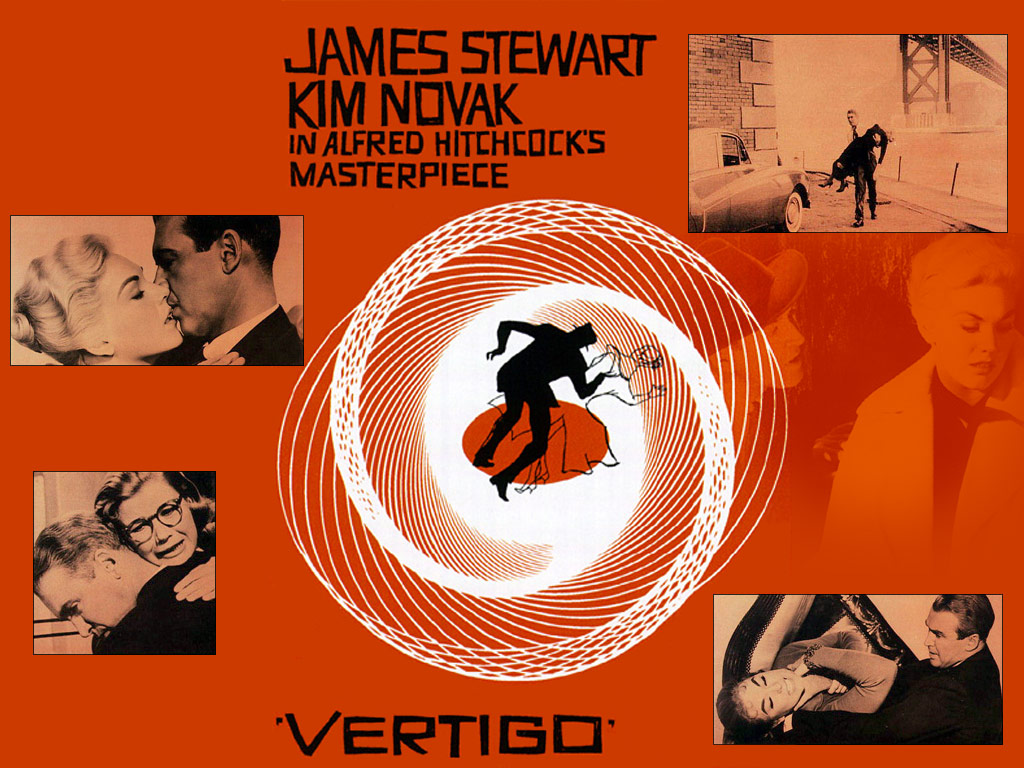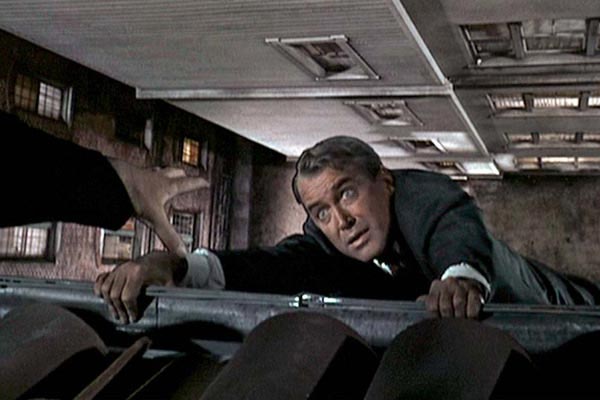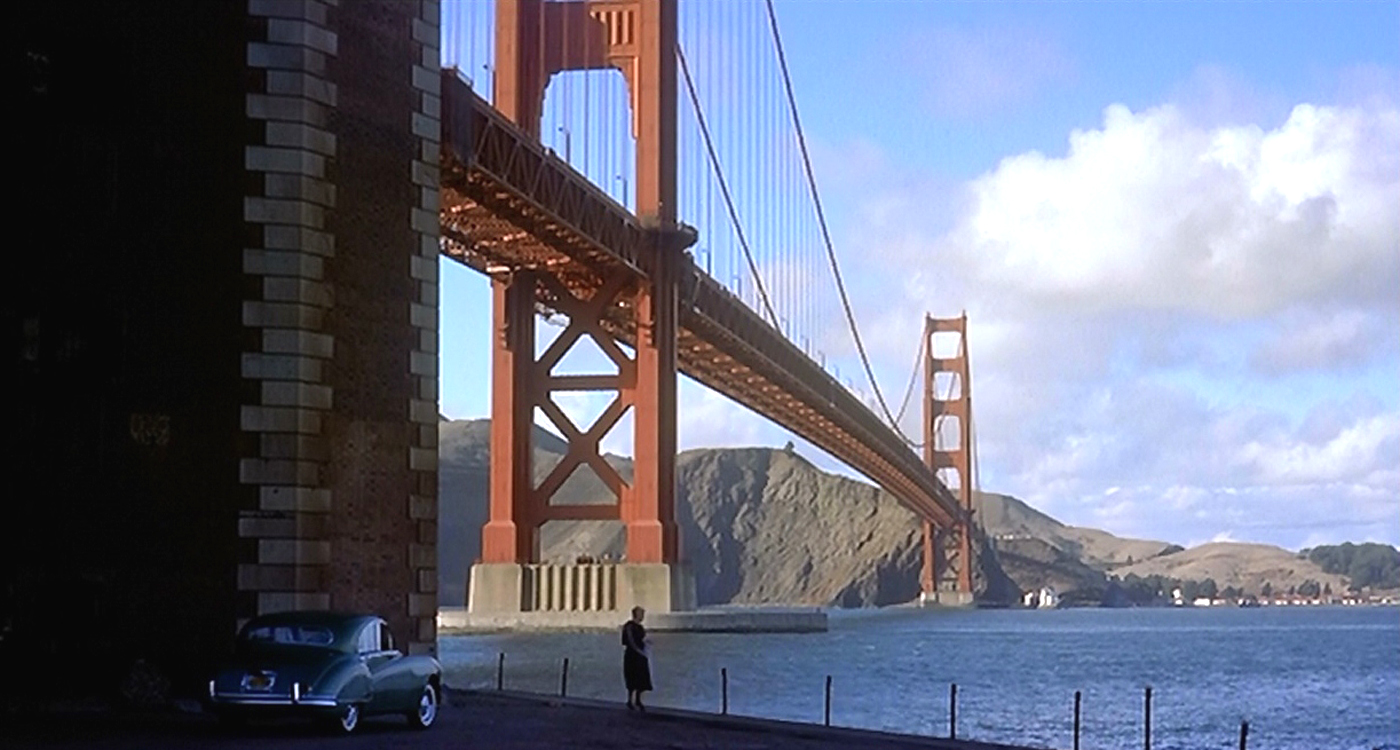Vertigo (1958)
 Tuesday, February 3, 2015 at 9:37PM
Tuesday, February 3, 2015 at 9:37PM 
We come to it at last! No more waiting, no more suspense (aka waiting for the bomb to explode), and plenty more vibrant colors then we’ve seen previously in films by the Master of Suspense! Apparently regarded as a better and better film with time (Sight And Sound’s 2012 poll of directors, writers and critics worldwide had it at #1 among voters) Vertigo was altogether off of my radar besides such aspects as the iconic love theme, the infamous dolly-in, zoom-out effect (or vice versa) and notes from family that it was colorful (whether that meant literally or figuratively was unknown to me until now). After 13 posts on films made before this “masterpiece” however, I’ve finally come to the point where I view what Hitchcock could do at his arguable apex. If I were able to classify my feelings as symptoms of Vertigo : early enamoration with only slighty lessened optimism after 2 hours.
 Let me start by elaborating on that first symptom regarding enamoration (which if not a word, should be): wowza (this has less of a chance of being a real word… but it should be as well)! The opening credit sequence is amazingly, surprisingly, stupendously so much more cinematic than that of Hitch's previous films (and by extension many others) that my jaw was literally dropped possibly earlier on than in any other films. You will find no traditional credits sequence (i.e. including lack of apparent book pages full of actors and crew) but you will see visuals that seem to go far beyond 1958 in regards to their uniqueness. It could be this remastered Blu-ray (via the special features, apparently Universal put in 2 years and 1 million buck to restore the physically decrepit negative) but other movies get their cleaning time too and yet this looks vastly superior. Overall, if I was otherwise uninformed it appears to be a film from the 1978 rather than 1958. The music doesn’t hurt either; backing the awe-inspiring void on the screen full of yearning, haunting, and love all at once, this sequence leads us to a film so much more natural (and cinematic at the same time) than most films before and many after.
Let me start by elaborating on that first symptom regarding enamoration (which if not a word, should be): wowza (this has less of a chance of being a real word… but it should be as well)! The opening credit sequence is amazingly, surprisingly, stupendously so much more cinematic than that of Hitch's previous films (and by extension many others) that my jaw was literally dropped possibly earlier on than in any other films. You will find no traditional credits sequence (i.e. including lack of apparent book pages full of actors and crew) but you will see visuals that seem to go far beyond 1958 in regards to their uniqueness. It could be this remastered Blu-ray (via the special features, apparently Universal put in 2 years and 1 million buck to restore the physically decrepit negative) but other movies get their cleaning time too and yet this looks vastly superior. Overall, if I was otherwise uninformed it appears to be a film from the 1978 rather than 1958. The music doesn’t hurt either; backing the awe-inspiring void on the screen full of yearning, haunting, and love all at once, this sequence leads us to a film so much more natural (and cinematic at the same time) than most films before and many after.
If Hitch had phases during his career, this is Phase III (that is if Marvel Phase III ends up being the best) with The Man Who Knew Too Much and Rear Window being soft beginnings to the epoch. It’s unbelievable that it was made only 2 years after the former, especially as besides rear screen projection and cinematography, so many of his regular story, plot points, and other cinematic traits aren’t necessarily present. Here he seems to go above and beyond his already experienced and sharpened skills into a realm of nirvana for cinema. I’m so struck that there needs to be a new term like…Cinemana?
Probably not, but that is fairly representative of how it felt, and made me realize how I feel about my most favorite movies: important aspects such as story and visuals are in place, but all other combined aspects of the film lead to something that goes far beyond the first two points. It transcends these traditional defaults. So much so, that it almost becomes secondary to everything surrounding the story (and doesn’t work for everyone, Michael Bay).

Still even in my blissful state, I can/need to dig into some of the details of this standout by Hitch:
- San Francisco is ideal setting: with so many driving scenes, the hills obstruct the pursuit and keep for a mysterious ride
- Acting by Stewart was expectedly, but the unknown (to me ) Novak excelled
- Music was great (#already covered)
- Colors were vibrant, with only issue being almost too vibrant dream sequence (maybe title should’ve been Technicolor Dream Boat)
I wish I had more, but this really is a superior oddity in the director’s filmography (and I’m still reflecting on how it made me feel). As the film progresses, I have to be honest that I was distracted trying to decipher why so many cinephiles have recently thought this film was greater than Citizen Kane. I can’t say I agree at the moment, but can certainly see reasons why the propose it. He rises above all of his usual traits – the McGuffin, the mystery, the innocent man, even the suspense to a substantial degree – substituting it with romance, obsession, and how both completely overtake the main character.
I’ve just realized that I completely skipped over what the plot even was! As you may be able to gather from the rest of the post, that may just be one of the unique effects of Vertigo.
 Cinebriated,
Cinebriated,  Colorful,
Colorful,  Hitchcock Chaser,
Hitchcock Chaser,  Suspense in
Suspense in  Hitchcock Chasers
Hitchcock Chasers 


Reader Comments